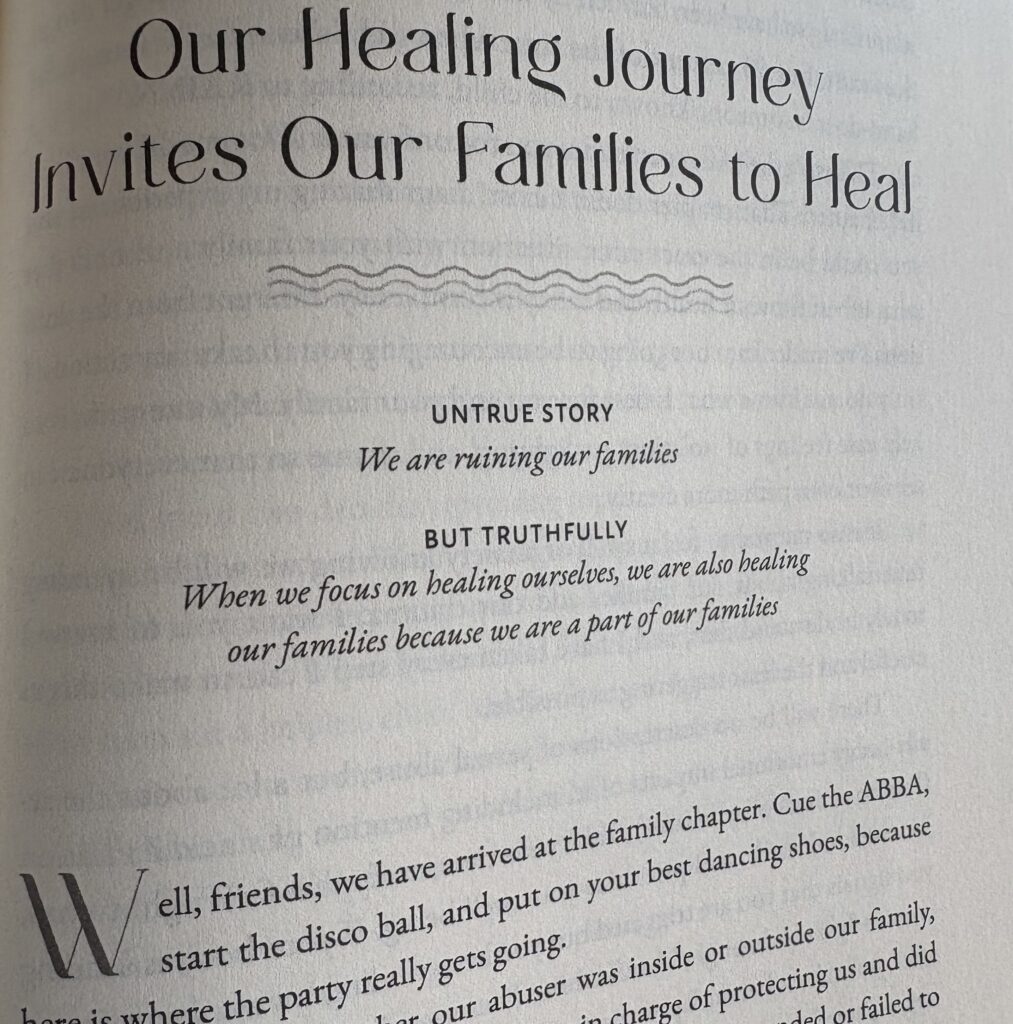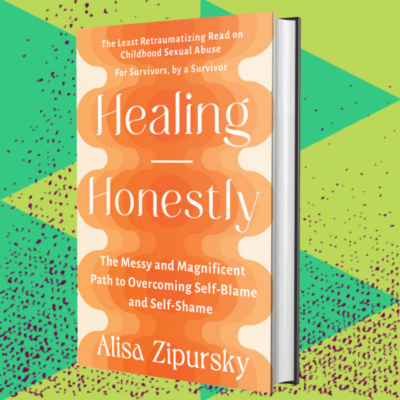I received an excellent question from Carla, longtime Healing Honestly reader and community member. Carla is one of the contributing survivors featured in Healing Honestly the book!
Here’s Carla’s question:
I’ve come to the decision that I’d like to tell my parents about my abuse. I’ve noticed that my most intense trauma responses are in reaction to feeling like I’m not being heard or understood, or that my concerns are being diminished or ignored.
I’ve put this off because I’ve always tried to protect my parents’ emotions, something I learned in therapy was a coping mechanism/survival technique I picked up from the abuse. Now that I’m an adult, I know I can’t expect anyone else to be responsible for my emotional regulation, so I need to stop doing this for my parents. I also think it would be really good for my healing to give my parents the opportunity to support me in the way I didn’t get immediately after the abuse.
Do you have any tips for disclosing abuse to parents? I have no reason to think their response will be anything but supportive, but that’s still my biggest fear.
Yes! Excellent question, Carla! I have so much to say on the subject that it’s actually an entire chapter in Healing Honestly:
CSA is always a family issue but it doesn’t mean we are required to share with our families
Whether we were harmed by a family member or a stranger, CSA is always a family issue. Our families were in charge of protecting us. And whether they knew what happened to us or not, it was their job to do everything in their power to prevent the abuse from happening.
In supporting thousands of other CSA survivors around the world, I find that often the lasting trauma we are healing from isn’t necessarily the actual abuse, but rather, how our families responded or failed to respond to our abuse in the aftermath of it.
We make the rules about disclosing our CSA
We are the victims, and as a result, we have to prioritize what is best for our safety and wellbeing. And for some of us that may be disclosing to our families, and for others it may mean never sharing with them, and for many of us it’s some mix of the two options. We make our own rules.

I have made different rules for different members of my family. In the years before I put all my business on the internet I told my mom everything, if you’re interested in how that went check her interview in Healing Honestly in chapter 7.
But I didn’t tell anyone on my dad’s side of the family except for one uncle who was always decent to me and had smaller children who I was worried about. I didn’t get into details with my uncle but told him his brother was abusive to me and instructed him to have conversations with his younger children and look for signs of trauma. I didn’t want anything from my uncle, and after his initial response of shock, I never heard from him again. That was over 10 years ago.
Just like with any other person in our lives, we decide what, if anything we share, when, and how much. We make the rules that are right for our own healing and safety.
It helps to be clear on why we are disclosing to our families
There’s no right or wrong reason we want to share with our families!
I personally understand the intense desire to have a parent understand us, to validate the reality of our abuse, and become a part of the healing process with us. It’s the most natural thing in the world to wish for. And each of us deserve that and so much more. I will never tell you not to wish for that (we love a double negative over here.)
But I think it can be useful to understand what we are looking for from the disclosure. Carla did a beautiful job examining her why. It’s clear Carla is not interested in sharing with her parents out of a sense of obligation or guilt. But rather, Carla wants to tell them for herself and her own healing.
We, unfortunately, cannot control how our families react to our disclosures. And for reasons we will get into, often (like the vast majority of the time) their initial first reactions are garbagio.

So it can be really helpful for us to be aware of our why. I encourage us to disclose if it’s what we need for our own healing, but not because we need a certain response from our families in order to know our abuse was real and our pain matters. Because, due to their own bullshit and internalized shame that has nothing to do with us, we often can’t rely on our families to provide us validation.
I never confronted my father, despite what people often assume, because I knew that it wasn’t what was best for my own safety and healing. I knew exactly how he would respond and I don’t want to go through that mental torture and gaslighting. 23 years of that was plenty, thanks. I’d love for him to have admitted what he’s done, but I know he never would and it would only hurt me more to try to get that from him. Someone else can go through exactly what I did but need something else for their healing and that’s totally cool too.
You knew I had to bring up boundaries
Sorry to be this predictable and I support any/all eye rolls but we aren’t going into these conversations without BOUNDARIES. We already talked about some boundaries, including only sharing what we want, with who we want, whenever and however we want.
Here are some examples of other boundaries to inspire your own plans:
- You are only going to speak to the person you want to share with when they are alone or in a certain environment
- Establishing a care plan for yourself after the conversation, like speaking with a safe person who can help you get back in your body and get grounded, or going to a place that feels safe for you, or moving your body in a way that helps your nervous system chill out.
You can tell your family precisely how you’d like them to respond. They can be in shock and not know what to say and as a result they can unintentionally say some really harmful things. There’s no guarantee that they’ll follow your instructions but it can be good to give them the option to say the right thing. This can look like:
- “I want to hear you say that you believe me and support me”
- The only question I want you to ask is, “How can I support you on your healing?”
- “I want you to say that you love me and you have my back.”
You dictate to the family member what you will and won’t answer/discuss like:
- I’d love to hear that you believe me and support me, but I will not answer questions about how I know this happened to me
- Do not ask me questions about my trauma symptoms or looking for “evidence”
- I won’t allow for speculation on whether my therapist has influenced my understanding of my abuse
- Remember that our family’s reaction is not about us, even though it hurts us
- We deserve our truth to be met with love, support and validation. We deserve to have family members who are doing their own healing work to release any internalized shame they carry so that they can meet us with love and compassion.

Too often we don’t get any of what we deserve and instead are met with flaming piles of dog poo we never asked for and certainly do not deserve.
While our family’s reaction can hurt us so deeply and touch every part of our heart, we have to
remember that their reactions are not actually about us. You’ve done nothing wrong, or should’ve done anything differently even if your family’s response sucks. Their bullshit is never a reflection on your truth or how real your pain is.
There are so many reasons our families may have initial terrible reactions, including:
- They have their own shame and self-blame about not protecting us and their brains are protecting them from actually feeling the weight of those feelings.
- They are afraid what other people will think of them for failing to protect us.
- They are also traumatized and this information is triggering a traumatic response within them.
- They want to protect the abuser and not deal with the reality that they are capable of doing this.
All these reasons have to do with them and not us. If anyone makes us feel ashamed it is a reflection on them because we have nothing to be ashamed of. I know it’s extremely hard, but as best as we can we need to understand that their shame isn’t ours to hold. And as much as we’d love to heal together within our family, we cannot actually make anyone want to do their own healing work.
Also sometimes people need time, and I mean like years, to do their own healing and educate themselves. I’ve known for a lot of people (myself included!) the initial reactions of family members may have been extremely disappointing and hurtful but in time some of our family members learned how to show up in a way that is supportive and loving.
I don’t mean to say this to scare anyone from taking action that is best for themselves! Providing all this information in case things go south is the best way I know how to support another CSA survivor.
We will always are here for you and will be supporting you each step of the way
I hope that it is a productive and healing experience for you! And no matter what, know that we are all always here with you and we see you and support you. You are never alone in this and we all have your back.



